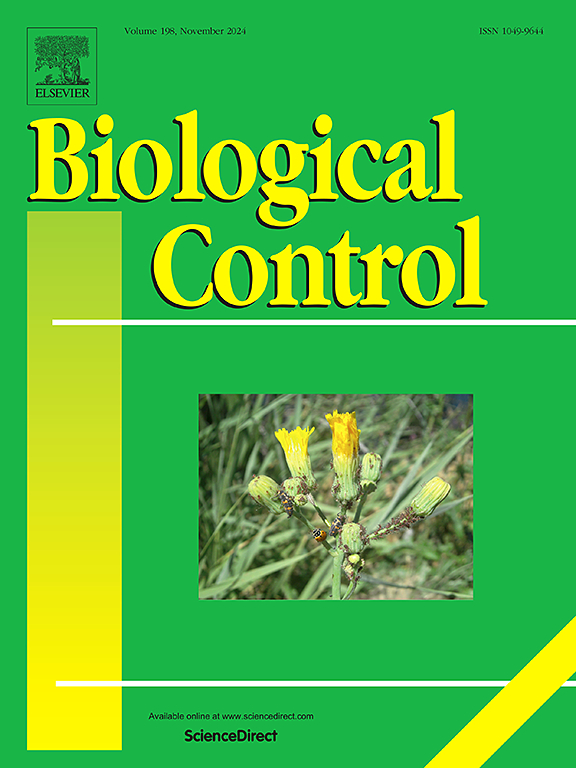Susceptibility of European Agrilus beetle species to the biocontrol agents of Emerald Ash Borer in the laboratory
IF 3.7
2区 农林科学
Q2 BIOTECHNOLOGY & APPLIED MICROBIOLOGY
引用次数: 0
Abstract
The emerald ash borer (EAB, Agrilus planipennis Fairmaire (Coleoptera: Buprestidae) is devastating ash trees in its invaded range of North America and spreading rapidly towards Western Europe from European Russia and Ukraine. To allow a rapid response when the beetle is detected, slow its spread and protect trees as part of a wider integrated pest management programme, pre-emptive biological control strategies that are suitable for Great Britain and the rest of Europe must urgently be developed. Three classical hymenopteran biological control agents have been mass-reared and released within North America to control EAB: the egg parasitoid Oobius agrili Zhang and Huang (Hymenoptera: Encyrtidae), and the larval parasitoids Tetrastichus planipennisi and Spathius galinae Belokobylskij & Strazanac (Hymenoptera: Braconidae). This study presents data on the risk these parasitoid wasps might pose to British Agrilus beetles. “No-choice” laboratory assays tested the susceptibility of A. biguttatus Fabricus eggs and larvae and A. sulcicollis Lacordaire and A. convexicollis Redtenbacher eggs to the parasitoids. Oobius agrili, T. planipennisi and S. galinae all attacked A. biguttatus, and offspring were produced. Oobius agrili also attacked the eggs of A. convexicollis, but not A. sulcicollis. This study is the first to show parasitism of a non-target species by T. planipennisi. Further work is needed to fully assess the non-target risk of these parasitoids for release using more ecologically relevant tests, such as ‘choice’, semi-field and chemical ecology assays on the attacked Agrilus species.
实验室研究了欧洲凤头甲虫对绿灰螟虫生物防治剂的敏感性
绿灰螟(EAB, Agrilus planipennis Fairmaire)(鞘翅目:bupredae)在其入侵的北美范围内是毁灭性的灰树,并从欧洲俄罗斯和乌克兰迅速向西欧蔓延。为了在发现这种甲虫时做出快速反应,减缓其传播,并作为更广泛的综合虫害管理计划的一部分保护树木,必须紧急开发适合英国和欧洲其他地区的先发制人的生物控制策略。三种典型的膜翅目生物防治剂已在北美大量饲养和释放,以控制EAB:卵寄生蜂obius agrili Zhang和Huang(膜翅目:蜂科),幼虫寄生蜂Tetrastichus planipennisi和Spathius galinae Belokobylskij &;小蜂(膜翅目:小蜂科)。这项研究提供了这些寄生蜂可能对英国Agrilus甲虫构成风险的数据。“无选择”实验室试验检测了长尾蠓卵和幼虫、长尾蠓卵和凸尾蠓卵对拟寄生虫的敏感性。农业乌比乌斯、平齿乌比乌斯和灰齿乌比乌斯都攻击了异齿乌比乌斯,并产生了后代。农业乌比乌斯也会攻击凸斑姬蜂的卵,但不会攻击沟斑姬蜂。本研究首次证实了扁叶蝉寄生于非靶种。需要进一步的工作来充分评估这些类寄生虫释放的非目标风险,使用更多的生态相关试验,例如对被攻击的Agrilus物种进行“选择”、半田间和化学生态学试验。
本文章由计算机程序翻译,如有差异,请以英文原文为准。
求助全文
约1分钟内获得全文
求助全文
来源期刊

Biological Control
生物-昆虫学
CiteScore
7.40
自引率
7.10%
发文量
220
审稿时长
63 days
期刊介绍:
Biological control is an environmentally sound and effective means of reducing or mitigating pests and pest effects through the use of natural enemies. The aim of Biological Control is to promote this science and technology through publication of original research articles and reviews of research and theory. The journal devotes a section to reports on biotechnologies dealing with the elucidation and use of genes or gene products for the enhancement of biological control agents.
The journal encompasses biological control of viral, microbial, nematode, insect, mite, weed, and vertebrate pests in agriculture, aquatic, forest, natural resource, stored product, and urban environments. Biological control of arthropod pests of human and domestic animals is also included. Ecological, molecular, and biotechnological approaches to the understanding of biological control are welcome.
 求助内容:
求助内容: 应助结果提醒方式:
应助结果提醒方式:


